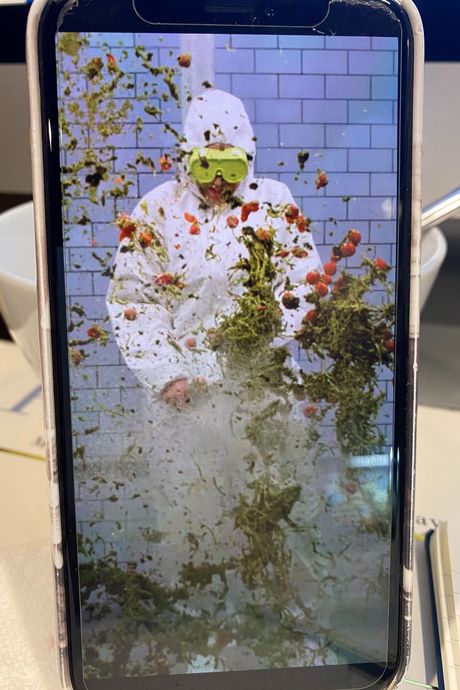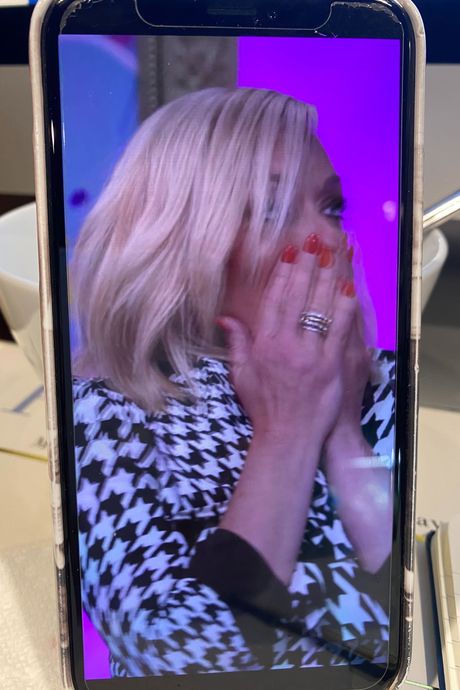
I’ve watched so many Quibi shows. I’ve seen the one where they make over a murder house. I’ve seen the one where Sophie Turner keeps thinking about suicide. I’ve seen the Sasha Velour one, and the Chance the Rapper one, and the one where Offset enjoys cars. But until yesterday, I had no idea there was a Quibi show where Rachel Brosnahan begs her lumberjack husband to make her an arm out of gold and then refuses to take off that golden arm even though it poisons her to death.
That show, Sam Raimi’s 50 States of Fright, is real, and I only discovered it because someone took one phone and recorded a video of a different phone playing it on the Quibi app, then posted a clip on Twitter. In just a day, it was been viewed more than a million times.
I feel pretty confident that a lot of people who watched this clip — where, I just need to emphasize, Rachel Brosnahan gets “pulmonary gold disease” because she falls in love with her haunted gold arm — did not previously know 50 States of Fright existed. There’s a reason for that: Quibi, an app that plays short, mobile-friendly video content, won’t let you screenshot any of its shows. You can’t stream Quibi on a traditional monitor or TV screen, which also means it’s very difficult to turn into GIFs. It’s really, really hard to share in any way as images or as clips. If you send a link to a friend, the link prompts them to download the app and make an account. If there’s a Quibi show you sincerely like, there’s no simple way to share it; your best bet is to tell them the name of the show and hope they remember to search for it after going through all those steps to set up an account. By the same token, it’s hard to turn a Quibi show into memes, which also means it’s tough to joke about. This is both an unbelievable misstep on Quibi’s part and a real killjoy for everybody else.
As Julia Alexander wrote on the Verge, this is not just a Quibi problem. “Netflix, Hulu, Disney Plus and other video apps also have their content blacked out when people take screenshots,” she explains. But while many of those services also allow browser support that can help users circumvent the in-app blocking — you can screenshot a Netflix show if you’re watching on Chrome, for instance — Quibi is deliberately, definitively mobile-only. There’s no browser version of Quibi, and unlike mobile-video competitor Snapchat, there’s no social function within the app either. You can’t even share stuff inside Quibi.
The result is the frustrating case of Rachel Brosnahan’s golden arm: a perfect, made-for-meming moment on a weird, little-known series that could leap into wider cultural awareness if it were easier for anyone to share the dang thing. But instead, we’re stuck watching a phone taking a video of another phone as though we’ve all been catapulted 20 years into the past, when we used our Canon PowerShots to take pictures of what’s happening on Babylon 5 this week and then upload them to our Flickr accounts to share them with our friends.
Screenshots, memes, GIFs, and other small excerpts are essentially forms of quotation. They act as shareable pieces of larger works, sometimes with the goal of illuminating the work they come from, but often getting cut away from their original contexts, sent out into the world to stand on their own and gather their own meanings. GIFs are the most common out-of-context excerpts of longer video works, so expressive and self-sufficient that they can communicate an idea without carrying along any of their original framework. Screenshots can function the same way, often speaking more toward the context in which they’re being deployed than referencing the original work. They become their own form of language, but as they circulate and accrete new meanings, they also make the images, reactions, stories, and personalities from the original work more familiar, more of a bedrock part of cultural discourse. Carole Baskin’s “Hey all you cool cats and kittens!” line quickly became a reference to Tiger King, for instance, but it’s also accrued its own implications separate from the show — it’s a weird greeting, an awkwardly mannered way to start speaking, a intro with just a touch of self-awareness and also not nearly enough social awareness.
Sadly, I cannot take a screenshot of Rachel Brosnahan yelling, “When I die, bury me with my golden arm!” and use it the way I want to, which is to share it on Twitter with the caption “republican CEOs on the importance of re-opening the economy.” By preventing its users from making screenshots and by generally making it hard to share its content in the way much cultural conversation happens online, Quibi is doing its best to stop users from talking about Quibi shows at all. You can understand why, a little. If it’s easy for users to share a Quibi show, there’s a decent chance that what they’ll be saying is “look how bad this is.” Quibi’s celebrity charity series Thanks a Million could become grist for screenshots mocking the high-powered celebrity partners for their grossly milquetoast gestures of generosity. Screenshots of Survive, the Sophie Turner suicidal-ideation show, could be seriously triggering for some people, but I also think it’d spark the kind of incendiary backlash that got 13 Reasons Why into hot water. This is the trade-off Quibi is making: No one can share their content, but that also means Quibi has more control over how its content appears in the world. There are no Quibi memes, but from Quibi’s perspective, at least there are no negative Quibi memes.
Instead, Quibi’s goal is to capitalize on any organic engagement themselves, controlling not only the content but also any kind of conversation about the content. The resistance to screenshots short-circuits any contributions from regular people. Most conversation about Quibi is monetized conversation, approved and synergized with the brand strategy. They’re not the first platform to try this: Netflix has perfected this kind of branded meme promotional strategy, using its many official Twitter feeds to mimic the way people discuss and digest Netflix shows. But because there are work-arounds for screenshotting on Netflix, those official accounts still exist alongside the contributions from regular viewers. Quibi’s social-media strategy exists largely instead of organic conversation. Not long after that tweet about 50 Stages of Fright went viral, Quibi’s Twitter account posted this tweet with a GIF from the show. It’s a wink at the sudden conversation about Rachel Brosnahan’s golden arm, but it doesn’t engage or replicate or respond to anything about the tenor of the conversation, which means it is very stupid.
It’d be one thing if Quibi were making serious, thoughtful stories meant to be savored at length and considered in total, lest their careful artistry be reduced to oversimplification. But Quibi’s shows are perfect for stupid memes and social sharing. There are appearances by major celebrities like Ariana Grande, which, as Alexander points out, should have been a shareable moment for her fans, but instead, left them circumventing Quibi by taking screen recordings of Grande’s Instagram. The entire point of a show like Punk’d is to capture celebrities being caught off guard, which make for ideal clips online but instead are stuck inside Quibi’s walled-garden app. And then there are shows like Dishmantled, a food competition hosted by Tituss Burgess that asks contestants to re-create a dish based only on what they can taste after it’s blasted at them from a cannon. I would love to show you what that looks like, but the only way to do it was to borrow my husband’s phone, prop my phone up against the bowl of mac and cheese I’d eaten for lunch, and take these underwhelming photos.


It’s still early for Quibi, and it’s too soon to know whether its billion-dollar bet on mobile-only video will pay off. But not being able to screenshot any of it makes the entire platform feel immediately less relevant and less interesting for the cultural conversation. Standing out among the crowd of video content is the whole ball game for new platforms. As my colleague Megh Wright put it, “If I can’t screenshot a show, does it even exist?”


